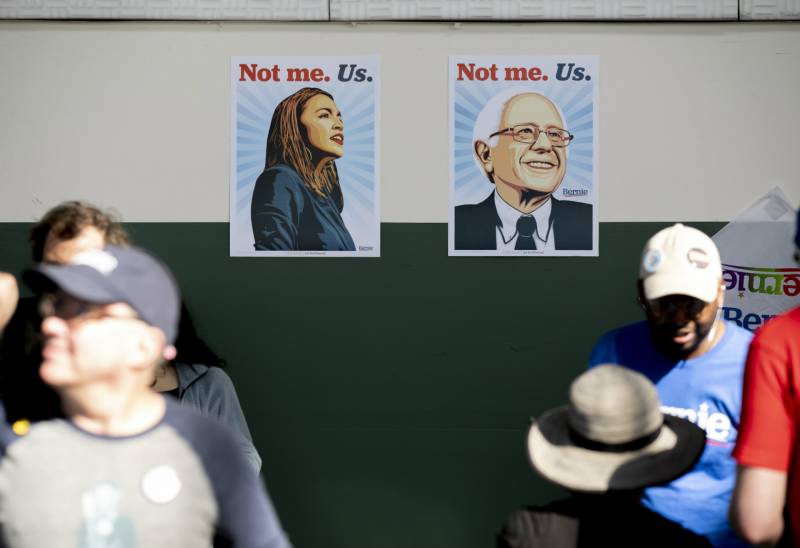Ballots are still being tallied, but if nothing else, Sen. Bernie Sanders’ robust showing in the California Democratic primary proves this: In the state that gave the nation Richard Nixon, Ronald Reagan and the anti-tax revolt, a decisive chunk of the Democratic electorate is no longer allergic to the word “socialism.”
It’s a political milestone in California history. But it’s not a new one.
In Depression-era 1934, Upton Sinclair, the muckraking author of "The Jungle," ran seeking the Democratic nomination for governor and won it decisively, racking up more than 50% of the vote.
Like Sanders, Sinclair was a long-time self-described socialist — though without the “Democratic” suffix that the Vermont senator favors today.

And like Sanders, Sinclair led a grassroots political movement that existed outside the formal Democratic Party structure, seeking to usher young radicals into the party and radical policies into the mainstream. He, too, drew skepticism and disdain from the “establishment” of his time. Even President Franklin Roosevelt refused to endorse him.
Sinclair went onto lose the general election for governor in a three-way race, after a concerted opposition campaign from the right that equated his policies with Communism. But historians say his campaign offered a strong, leftward shove to both California Democratic politics and the national policy agenda of FDR’s New Deal. Stanley Mosk, who cast his first vote for Sinclair and would go on to become associate justice of the California Supreme Court, recalled Sinclair’s campaign as “the acorn from which evolved the tree of whatever liberalism we have in California.”
But as the Cold War set in, the “s”-word became an epithet and an electoral nonstarter in mainstream California politics. There were exceptions — such as the 1970 election of Berkeley Rep. Ronald Dellums, the first Democratic Socialist sent to Congress in the post-WWII era — but they proved the rule.

Then Sanders turned in a surprise showing in his 2016 bid for president, winning 46% of the California primary vote to Hillary Clinton’s 53%.
Now he is forecasted to ultimately win the 2020 California Democratic primary, although the counting may take days if not weeks.
So would a Sanders victory suggest that the socialist label might be ready for a comeback here? Maybe. Note that San Francisco recently elected Chesa Boudin, the son of the leftist militants, as its district attorney.
As moderate former Vice President Joe Biden turned in a strong showing in several of the Super Tuesday states where results rolled in early, the final pre-election California polls indicated that Sanders was winning with a third of the vote here — and showing particular strength with young voters and Latinos while leading in every region statewide.
The FiveThirtyEight model gave him a 76% chance of winning the popular vote in the state. And preliminary exit polls by Edison Research indicating that Californians voting Democratic in 2020 are more liberal than in previous years.
What that also means: Two-thirds of voters in the California Democratic primary expected to vote for candidates not named Bernie Sanders.
“What does socialism mean here now?” said Lawrence Rosenthal, chair of the Center for Right-Wing Studies at UC Berkeley. “Does it carry the boogeyman qualities it had before the (Berlin) Wall fell, which was considerable? Whether it still has electoral legs in California or anywhere else is a really good question.”
And if there’s any question that the voters who rallied to the Vermont senator in California somehow neglected to notice the “Democratic Socialist” label he’s been proudly boasting for years, consider a recent CBS poll. Taken the week before Election Day, the survey found that 57% of likely Democratic primary voters in the state had either a “very positive” or “somewhat positive” view of socialism, compared to only 45% who felt the same about capitalism.
Though pollsters don’t regularly ask about “socialism,” that appears consistent with views among Democratic voters nationwide. A Gallup national survey from 2018 found a nearly identical breakdown, with 57% holding favorable views of socialism and 47% backing capitalism.
That was driven by the responses of market-skeptical young respondents. It was also unique to self-described Democrats. On the whole, only 37% of the 1,505 adults surveyed reported feeling positive about socialism.

